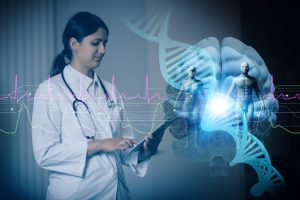
Owkin’s AI solutions for breast and colorectal cancer receive European approval – MedCity News

Artificial intelligence biotech company Owkin announced Friday that its rapid AI diagnostic solutions for breast cancer and colorectal cancer have been approved for use in Europe.
The tests are the first approved diagnostics created by Owkin, which has offices in New York City and Paris. One of the solutions is RlapsRisk BC, which uses AI to predict if a breast cancer patient will relapse after treatment. The test helps oncologists determine which patients would benefit from targeted therapies and which could avoid chemotherapy, according to a news release.
The other solution is MSIntuit CRC. This is an AI digital pathology diagnostic solution that pre-screens for the microsatellite instability (MSI) biomarker in colorectal cancer tumors. MSI is a defect in a cell’s ability to correct mistakes when DNA is copied. Owkin’s solution allows pathologists to rule out microsatellite stable phenotypes and only focus on patients showing MSI. This will help clinicians determine sooner what the most effective treatment is for patients.
Both tests are the first of their kind, claimed Michaël Auffret, the senior vice president of diagnostic products and regulatory at Owkin. RlapsRisk BC is the first CE-IVD approved digital pathology-based AI diagnostic that predicts if early breast cancer patients will relapse, while MSIntuit CRC is the first CE-IVD approved solution that allows for the identification of microsatellite stable patients.
These tests differ from standard processes like molecular testing or PCR testing because they are more inexpensive and produce faster results. The labs conducting the tests receive the results in-house and don’t have to send them out for analysis, Auffret said.
“You can process locally the data,” Auffret said. “As a consequence, the outcome of the device is going to be faster than any solutions that we require to send to a central lab.”
The tests are being sold to pathology labs, oncologists and surgeons, Auffret said. It is starting in France, Germany and the United Kingdom and then it will expand to other locations including the U.S.
He added that while the use of AI is becoming more common in healthcare, Owkin’s goal is to not replace the work done by pathologists, but provide valuable information.
“Our intent is to make [the solutions] fully integrated in the clinical workflow,” he said. “They’re innovative, but we don’t want them to disrupt the workflow of the pathologists and oncologists. We really want them to ease the work of the different specialists.”
Owkin has completed validation studies for each product, which will be published soon, Auffret said but declined to comment on the results.
A whole host of companies are leveraging AI in the life sciences in everything from digital pathology to helping pharma companies develop better drugs, something that Owkin itself is doing in its partnership with Sanofi. Another digital pathology company, Paige, is partnering with Janssen to develop and deploy an AI-based biomarker test for advanced bladder cancer in clinical settings.
For Owkin, getting CE-mark for the first time for its diagnostics products in breast and colorectal cancer is noteworthy.
“This is a major milestone,” Auffret said.
Photo: metamorworks, Getty Images